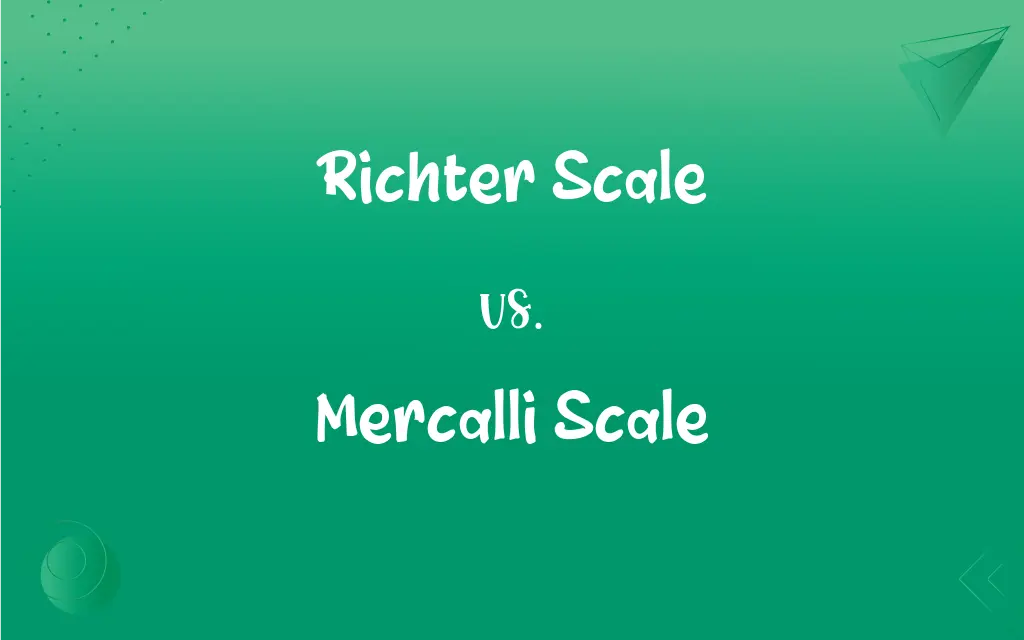Richter Scale vs. Mercalli Scale: What's the Difference?
Edited by Harlon Moss || By Janet White || Published on January 26, 2024
The Richter Scale measures earthquake magnitude based on seismic waves, while the Mercalli Scale assesses earthquake intensity based on observed effects.

Key Differences
The Richter Scale quantifies the energy released by an earthquake, using a logarithmic scale. The Mercalli Scale, in contrast, classifies earthquakes based on their observable effects on people, structures, and the Earth's surface.
Measurements on the Richter Scale are objective and based on scientific instruments. The Mercalli Scale, however, relies on subjective observations and can vary based on the distance from the epicenter and local conditions.
The Richter Scale provides a single numerical value to represent earthquake strength. The Mercalli Scale, conversely, uses a series of descriptive categories (I to XII) to convey the extent of damage and human perception.
Developed in 1935 by Charles F. Richter, the Richter Scale has since been supplemented by more comprehensive scales. The Mercalli Scale, formulated by Giuseppe Mercalli in 1902, remains useful for historical earthquakes and in areas lacking seismic instruments.
The Richter Scale is universally applicable, independent of the earthquake’s location. The Mercalli Scale’s assessment can differ for the same earthquake depending on the observer's location and experience.
ADVERTISEMENT
Comparison Chart
Basis of Measurement
Seismic wave energy
Observed effects
Nature of Scale
Logarithmic
Descriptive categories
Subjectivity
Objective
Subjective
Development Year
1935
1902
Global Applicability
Yes
Varies by location and observer
ADVERTISEMENT
Richter Scale and Mercalli Scale Definitions
Richter Scale
The Richter Scale allows for objective analysis of seismic events.
Emergency services used the Richter Scale reading to gauge the likely damage.
Mercalli Scale
The Mercalli Scale uses subjective observations to assess earthquakes.
Locals described the tremor as VI on the Mercalli Scale, indicating strong shaking.
Richter Scale
The Richter Scale is used globally to classify earthquake magnitudes.
The Richter Scale was essential in assessing the global impact of the earthquake.
Mercalli Scale
The Mercalli Scale provides detailed descriptions of earthquake effects.
According to the Mercalli Scale, the earthquake caused moderate damage to weak structures.
Richter Scale
The Richter Scale measures the magnitude of earthquakes on a logarithmic scale.
An earthquake of 5.0 on the Richter Scale is ten times more powerful than one of 4.0.
Mercalli Scale
The Mercalli Scale rates earthquake intensity based on observed effects.
The earthquake caused extensive damage, rated as IX on the Mercalli Scale.
Richter Scale
The Richter Scale quantifies the energy release of earthquakes.
Seismologists reported the quake as a 6.3 on the Richter Scale.
Mercalli Scale
The Mercalli Scale classifies earthquakes from I (not felt) to XII (total destruction).
The minor earthquake was classified as III on the Mercalli Scale.
Richter Scale
The Richter Scale provides a standardized method to compare earthquake strengths.
Historical earthquakes were retroactively assigned values on the Richter Scale.
Mercalli Scale
The Mercalli Scale is useful for understanding the human experience of earthquakes.
The Mercalli Scale rating helped historians understand the 1906 San Francisco earthquake's impact.
FAQs
How is the Richter Scale different from the magnitude scale?
The Richter Scale is a specific type of magnitude scale, now often supplemented by more comprehensive scales.
What does a Mercalli Scale rating of I mean?
It means the earthquake was not felt.
Can small earthquakes be measured on the Richter Scale?
Yes, even very small tremors can be measured.
Who invented the Richter Scale?
Charles F. Richter in 1935.
Can the Richter Scale measure all earthquakes?
Yes, it's designed to measure earthquakes of all magnitudes.
Is the Mercalli Scale still used today?
Yes, especially for non-instrumental earthquake assessment.
Does the Mercalli Scale require scientific instruments?
No, it's based on observable effects and human reports.
What's the highest rating on the Mercalli Scale?
XII, indicating total destruction.
Why is the Mercalli Scale subjective?
Because it's based on human observations and experiences.
Is the Richter Scale linear or logarithmic?
It's logarithmic, meaning each whole number increase represents a tenfold increase in magnitude.
Is the Mercalli Scale used for emergency response planning?
It can be used to understand potential impact but is less precise than instrumental scales.
How does the Mercalli Scale help in understanding historical earthquakes?
It provides insights based on descriptions of the earthquake's effects.
Are there earthquakes that don't register on the Richter Scale?
Virtually all earthquakes can be measured, but extremely minor ones may have negligible readings.
How accurate is the Mercalli Scale?
Its accuracy is limited by its reliance on subjective human observations.
Has the Richter Scale been updated or modified?
Yes, it has been supplemented by more comprehensive scales like the moment magnitude scale.
Why is the Mercalli Scale important in seismology?
It provides a qualitative measure of an earthquake's effects, useful for historical records and areas without advanced instruments.
Do modern seismologists use the Richter Scale?
They often use more modern scales, though the Richter Scale is still referenced.
Does the Richter Scale measure earthquake damage?
No, it measures energy release, not direct damage.
Can the Richter Scale predict future earthquakes?
No, it only measures the magnitude of earthquakes that have already occurred.
Can the Mercalli Scale rate earthquakes globally?
Its effectiveness varies based on the observer's location and experience.
About Author
Written by
Janet WhiteJanet White has been an esteemed writer and blogger for Difference Wiki. Holding a Master's degree in Science and Medical Journalism from the prestigious Boston University, she has consistently demonstrated her expertise and passion for her field. When she's not immersed in her work, Janet relishes her time exercising, delving into a good book, and cherishing moments with friends and family.
Edited by
Harlon MossHarlon is a seasoned quality moderator and accomplished content writer for Difference Wiki. An alumnus of the prestigious University of California, he earned his degree in Computer Science. Leveraging his academic background, Harlon brings a meticulous and informed perspective to his work, ensuring content accuracy and excellence.







































































